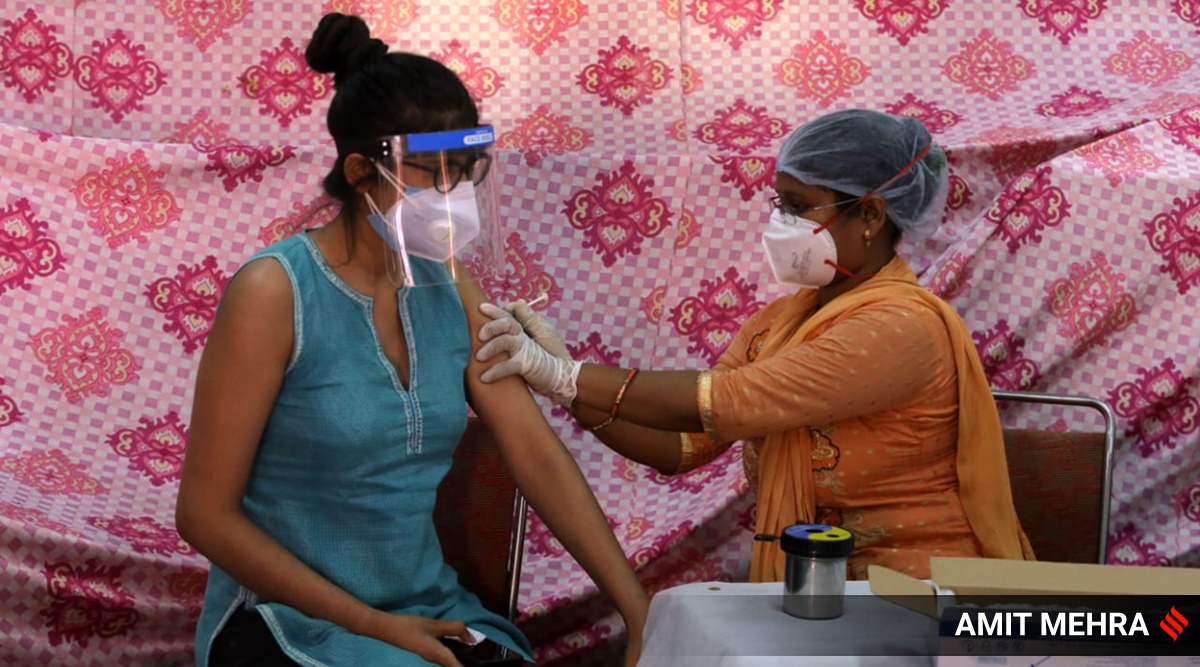 A young woman receives her first dose of a Covid-19 vaccine in New Delhi. (Express Photo: Amit Mehra)
A young woman receives her first dose of a Covid-19 vaccine in New Delhi. (Express Photo: Amit Mehra) JUST OVER seven weeks after it told states to increase the interval between two doses of Covishield to six-eight weeks, the Centre on Thursday extended the interval further to 12-16 weeks, citing “real-life evidence” from the UK.
The Union Health Ministry said that the decision was based on the recommendation of the seven-member Covid-19 Working Group. Covishield accounts for 90 per cent of the 17.8 crore vaccine doses administered so far.
Union Health Secretary Rajesh Bhushan conveyed the revised time frame to the states in a letter and said that necessary changes are being carried out in the Co-Win platform.
The decision comes at a time when several states have complained of a shortage of vaccines.
The Centre had asked states to prioritise the second dose of vaccination for the 45-plus age group.
Incidentally, just a day earlier, Health Minister Dr Harsh Vardhan told states that “70% at a minimum ought to be allocated to meet the requirement of the second dose, while 30% ought to be reserved for the first dose”.
On Thursday, in a meeting with six states, Harsh Vardhan said that “lack of availability of a second dose has been taken into consideration when guidelines for reserving 70% of vaccines were framed”.
First, it was 4 weeks for the 2nd dose, then 6-8 weeks and now we are told 12-16 weeks. Is this because there are not enough stocks of the vaccines for all who are eligible or because professional scientific advice says so? Can we expect some transparency from the Modi Govt? pic.twitter.com/DJy31KEA0a
— Jairam Ramesh (@Jairam_Ramesh) May 13, 2021
“The Covid Working Group has recommended extension of the gap between the first and second doses of Covishield vaccine to 12-16 weeks. The present gap between the two doses of Covishield vaccine is 6-8 weeks. Based on the available real-life evidence, particularly from the UK, the Covid-19 Working Group agreed for increasing the dosing interval to 12-16 weeks between two doses of Covishield vaccine. No change in interval of Covaxin vaccine doses was recommended,” the Health Ministry said.
Following the decision, Gujarat was one of the first states to alter its vaccination schedule. Citing the extension for Covishield, the state said that it was placing the vaccination of the 45-plus group on hold for three days from May 14 while the drive would continue for those who have registered and received confirmation in the 18-45 age group.
The Centre said its recommendation was also accepted by the National Expert Group on Vaccine Administration for Covid-19 (NEGVAC), headed by Dr V K Paul.
The decision was taken on the basis of consensus among experts, including those from the WHO who were invited to the review meeting, Paul said.
“Questions are being asked why the decision has been taken now? The data is periodically reviewed… Earlier, we spoke about 12 weeks, based on studies. However, now because the UK has done it for a period of time, a real-life experience of a large number of individuals is available,” Paul said.
“When we looked at that data, where we also invited experts from WHO, from a scientific point of view, we decided that when we introduce the change in the country there will be no extra risk. This is a dynamic situation based on periodic review. We need to have faith in our scientific process. The NTAGI (National Technical Advisory Group on Immunisation) has individuals of high integrity. It is a decision based on consensus,” he said.
Paul said that the earlier decision to extend the interval between shots to 6-8 weeks was based on preliminary scientific evidence that there was a possibility of breakthrough infection after vaccination.
“In the beginning, based on the studies conducted on Covishield, the scheduling was 4-6 weeks. When more data emerged, although unplanned, it revealed that if we increased the duration there was some advantage. At that time, when NTAGI, which is a standing committee and independent decision body, looked into the data, the UK had already made it 12 weeks. WHO also said that it should be 12 weeks. However, many countries did not do it,” Paul said.
“The decision of our scientific-technical community, which is anchored by ICMR, was that by doing this there could be an increase in breakthrough infection. This was based on data from both India and outside. We cannot afford to increase the risk. In their good faith and based on their scientific capabilities, without pressure from anybody, the decision had been taken to increase from 4-6 weeks to 4-8 weeks,” Paul said.
India’s decision comes almost three months after the UK took a decision to increase the gap to 12 weeks. In March, Public Health England said that “clinical evidence for the Covid-19 AstraZeneca vaccine shows better efficacy following a 12-week gap”.
On February 2, Oxford University had said that the effect of dosing interval on efficacy is “pronounced”, with vaccine efficacy rising from 54.9 per cent with an interval of less than six weeks to 82.4 per cent when spaced 12 or more weeks apart.
- The Indian Express website has been rated GREEN for its credibility and trustworthiness by Newsguard, a global service that rates news sources for their journalistic standards.

